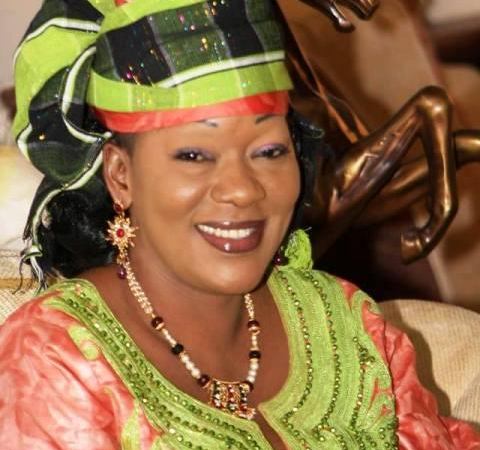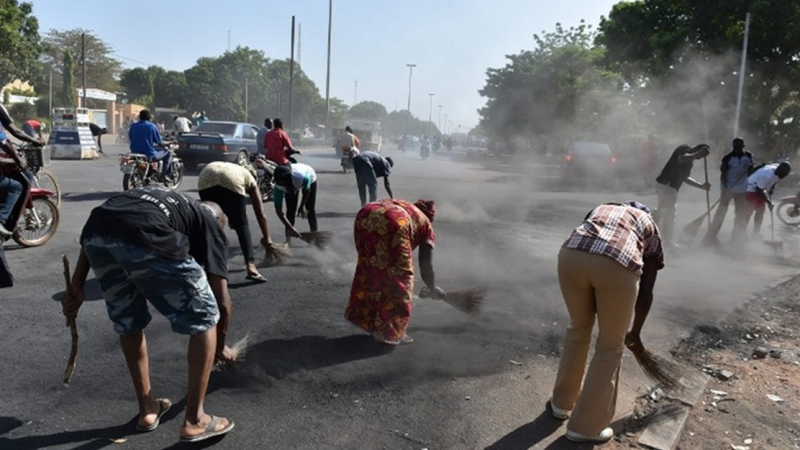
Saran Serémé Séré, president of the CDP opposition party, via Manya Riche on Twitter. (With permission.)
[All links lead to French-language pages unless otherwise indicated.]
Following Blaise Compaoré's departure and exile to Yamoussoukro, some uncertainty remains about the transitional presidency that's supposed to administer Burkina Faso until the next election.
Worryingly, in the space of just a few days, several public figures have already declared themselves leaders of the transitional government. On October 30, General Honoré Traoré announced himself president, only to be shoved aside by Lieutenant-Colonel Zida, the former second-in-command of the Presidential Guard. For some time, many have also speculated about retired General Kouamé Lougué's presidential potential. A fourth, civil-society candidate also seems to stand out: Saran Sérémé Séré, president of the CPD party [ed's note: ‘Congrès pour la démocratie et le progrès’, which means ‘Congress for Democracy and Progress’] and lead organiser of the anti-government protests that came to be known as the ‘Spatula Revolution’.
During this time of political uncertainty, civil society leaders have been especially wary of the military trying to seize power. Sérémé Séré, for example, writes on her Facebook page:
Ne laissons pas prendre en otage notre révolution populaire. pourquoi des militaires, en l’occurrence le chef d’état major général des armées par ci et le chef d’état major adjoint de la sécurité présidentielle par là, se bagarreraient ils pour une présidence durant une période éphémère, transitoire et surtout pour la récupération d'une lutte menée par le digne peuple burkinabé?
We should not let our grass-roots revolution get hijacked. Why is the military, namely the chief of the armed forces and the deputy chief of the Presidential Guard, jostling for the presidency in a time that is transient, transitory and, — above all — capitalising on the outcome of a dignified struggle by the people of Burkina Faso?
When Sérémé Séré and her supporters tried to broadcast a statement on national radio announcing their decision to steer the transition, security forces resorted to violence:
Burkina Faso: Tirs de sommation à la RTB, débandade de la foule Saran Sereme y était pour un déclaration. Article… http://t.co/oer0uuB2Gu
— koaci.com (@Koaci) November 2, 2014
Burkina Faso: Warning shots outside the RTB [‘Radiodiffusion Télévision du Burkina’, the national media outlet], crowd stampedes Saran Sereme was there to make a declaration. Read the full article… http://t.co/oer0uuB2Gu
— koaci.com (@Koaci) November 2, 2014
The tension between the army and activists isn't likely to subside any time soon, as there are already calls to protest Lieutenant-Colonel Zida's purported seizure of power [link in english]. Zida, nevertheless, has sought to reassure the country's youth about his good intentions. Appealing to young persons is no accident, moreover; the youth played an instrumental role in the demonstrations that brought down Compaoré's regime.
Despite Zida's outreach efforts, the opposition has remained largely skeptical about the army's plans. Indeed, Burkina Faso's constitution is clear on this point: the President of the National Assembly (the legislature) is supposed to take over, when there is a power “vacancy”. Salif Ouedraogo in Ouagadougou writes:
Nous sommes totalement contre la prise de pouvoir par les militaires. Nous réclamons un civil à la tête de l'État et demain nous allons nous regrouper place de la Révolution pour dire non au pouvoir militaire, même s'il faut que le peuple saigne davantage
We are totally opposed to the takeover of power by the military. We demand a civilian head of state and tomorrow we gather at Revolution Square to say ‘no’ to military power, even if this means more bloodshed.
Before these latest, fatal clashes outside the RTB national radio station, activists were by example, cleaning the streets of Ouagadougou after protests that brought together millions of civilians. Appealing to a sense of civic duty, the ‘Balai Citoyen’ [literally ‘citizen broom’] civil society group called on people to restore order in the capital. A young protester explains the importance of this gesture:
Hier on a balayé un président et aujourd’hui, on balaie les rues. Il fallait casser aussi, pour montrer qu'on n'a peur de rien [..]. Mais après tout ce qu'on a fait, il fallait rendre la ville propre. Maintenant, les étrangers vont venir, c'est comme si de rien n'était.
Yesterday we swept out a president and today we are sweeping the streets. We had to break things to show that we were not afraid of anything […]. But after everything we had done, we had to clean up the city. Now, foreigners will start coming again, as though nothing has happened.
While Burkina Faso's immediate future is still uncertain, the actions of its youth have already ended the 27-year reign of an African president. The video below shows the actions of the ‘balai’ [‘broom’] citizen movement, demanding greater democracy for Burkina Faso:
There is no doubt that other African leaders who want to change the law to extend their presidential terms (the leaders of Djibouti, Democratic Republic of Congo, Burundi, Congo Brazzaville, and Benin come to mind) will be closely monitoring what happens next in Burkina Faso. The obvious lesson so far is that no one can hold power ‘for life’. Compoaré learned this the hard way.








1 comment